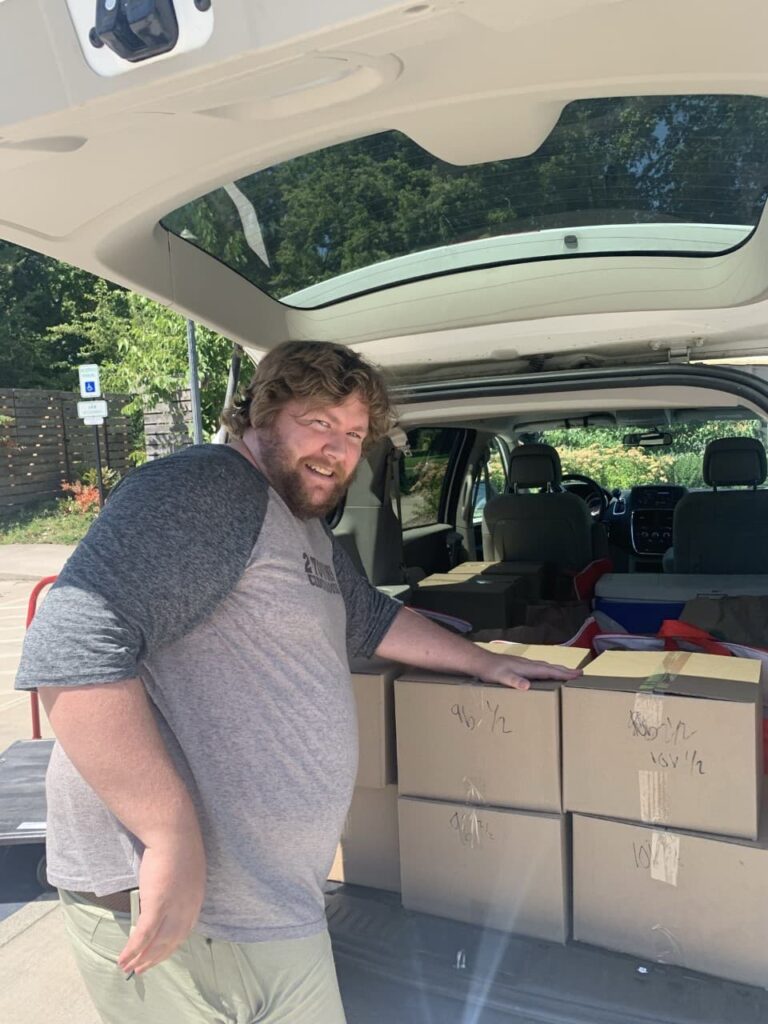
During a year full of uncertainty, it was clear that people were hurting and needed help, particularly around housing, mental health, isolation and food insecurity.
Doctoral student Nancy Vargas, who is studying health promotion and health behavior, saw the struggle firsthand while collecting COVID-19 research for ENLACE, a program within the college that builds solidarity, fights social isolation and amplifies Latinx LQBTQ+ youth voices. Many of the families she interviewed indicated that they were struggling to put food on the table.
“I struggled with food insecurity growing up, so I know what that’s like,” Nancy says. “We can’t have people think about vaccines or getting sick if we’re not addressing their immediate needs, and their immediate need is food.”
With this in mind, she reached out to Mario Magaña, CPHHS associate professor and outreach coordinator in OSU Extension’s 4-H program. Others from the college who joined the team included Adam Cary and Tina Dodge. Together, they created a food box delivery program through the 4-H program in partnership with OSU’s Human Resource Center (HRSC).
By March 2021, they began delivering biweekly food boxes to families in Corvallis, Albany, Lebanon, Eugene and Monroe, Oregon. HRSC provided the items for the boxes, which included seasonal produce, frozen meats, ramen and spaghetti, oatmeal, peanut butter, eggs, tofu, nuts, oil, bread and more. Participants were sent a survey ahead of their delivery so they could pre-select from available options.

Adam, a recent public health graduate, joined the team as an intern. He heard about the opportunity through a class where Nancy was a teaching assistant.
“Knowing how much of a difference we are making on a daily basis has been the most rewarding and most memorable part,” he says. “This experience showed me the barriers that Latinx communities face when trying to access much needed resources.”
Adam’s responsibilities included developing travel routes, collecting survey information, communicating with the HSRC, renting a van and loading it with boxes, and delivering the items with others on the team.
“For as long as I can remember, I have had an interest in a career in a health-related field. This experience was a great way to get hands-on experience in the field and help a community that was hit very hard by the pandemic,” he says.
Participants also felt the program’s benefits, sharing that they enjoyed the flexibility and easiness of involvement. One mother with a disabled daughter mentioned she struggled to go out and get food. When sharing feedback with the team, she specifically recalled a day when she couldn’t get milk for the cereal her daughter ate every morning. That day the delivery showed up with milk, which was only available occasionally.
“It’s moments like that that really help demonstrate the good our service is doing,” Adam says.
The program ended in July 2021, but Nancy plans to continue breaking barriers for marginalized communities and connecting them with the resources they need. She and Tina, an OSU Extension SNAP-Ed program coordinator, have also reached out to community resources such as Linn-Benton Foodshare to help create a similar program.
Additionally, Nancy recently received a grant from the American Federation of Teachers to promote getting vaccinated and making communities feel safe, including her call to continue addressing food insecurity.
“It is a COVID grant, but that’s one of the reasons we included this potential new food box distribution program. It just makes sense,” Nancy says. “We’re addressing their immediate needs in order so they can get moving on things like self-advocacy and vaccines. If you don’t have those immediate needs, it’s hard to do some of that work.”